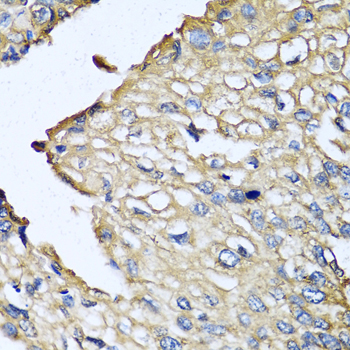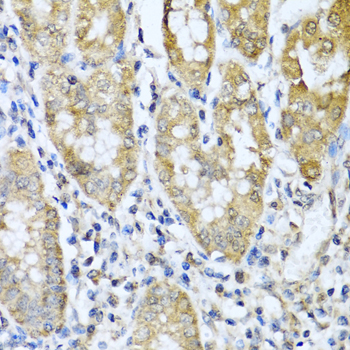-
Product Name
ASIP Polyclonal Antibody
- Documents
-
Description
Polyclonal antibody to ASIP
-
Tested applications
IHC, IF
-
Species reactivity
Mouse, Rat
-
Alternative names
ASIP antibody; AGSW antibody; AGTI antibody; AGTIL antibody; ASP antibody; SHEP9 antibody; agouti-signaling protein antibody
-
Isotype
Rabbit IgG
-
Preparation
Antigen: Recombinant fusion protein containing a sequence corresponding to amino acids 23-132 of human ASIP (NP_001663.2).
-
Clonality
Polyclonal
-
Formulation
PBS with 0.02% sodium azide, 50% glycerol, pH7.3.
-
Storage instructions
Store at -20℃. Avoid freeze / thaw cycles.
-
Applications
IHC 1:50 - 1:100
IF 1:50 - 1:100 -
Validations

Immunohistochemistry - ASIP Polyclonal Antibody
Immunohistochemistry of paraffin-embedded human prostate cancer using ASIP antibody at dilution of 1:100 (40x lens).

Immunohistochemistry - ASIP Polyclonal Antibody
Immunohistochemistry of paraffin-embedded human gastric cancer using ASIP antibody at dilution of 1:100 (40x lens).
-
Background
Involved in the regulation of melanogenesis. The binding of ASP to MC1R precludes alpha-MSH initiated signaling and thus blocks production of cAMP, leading to a down-regulation of eumelanogenesis (brown/black pigment) and thus increasing synthesis of pheomelanin (yellow/red pigment). In higher primates, agouti may affect the quality of hair pigmentation rather than its pattern of deposition. Could well play a role in neuroendocrine aspects of melanocortin action. May have some functional role in regulating the lipid metabolism with adipocytes.
Related Products / Services
Please note: All products are "FOR RESEARCH USE ONLY AND ARE NOT INTENDED FOR DIAGNOSTIC OR THERAPEUTIC USE"
